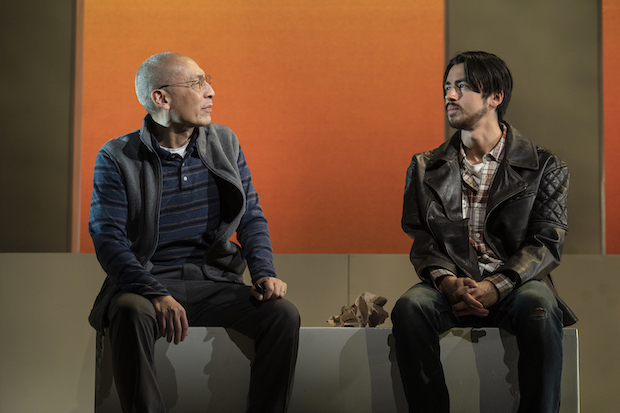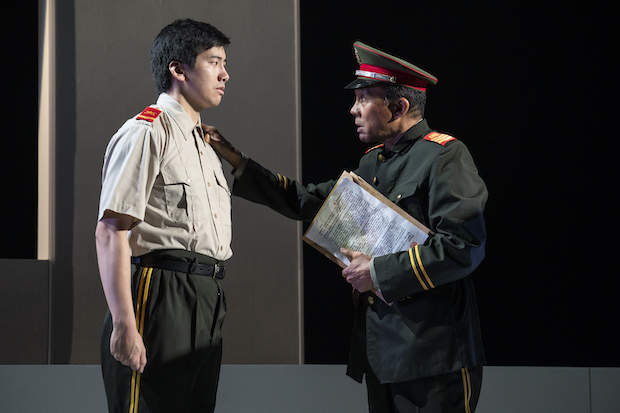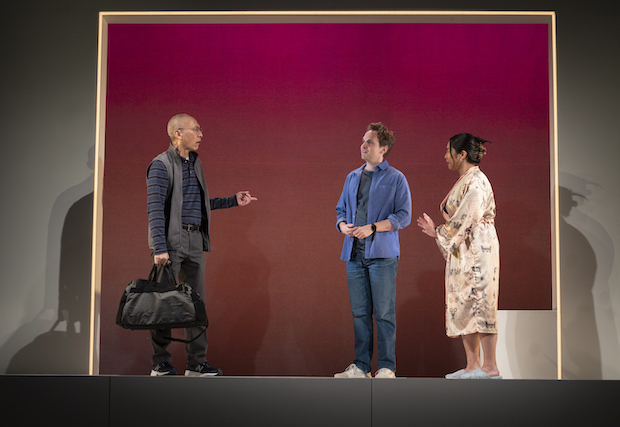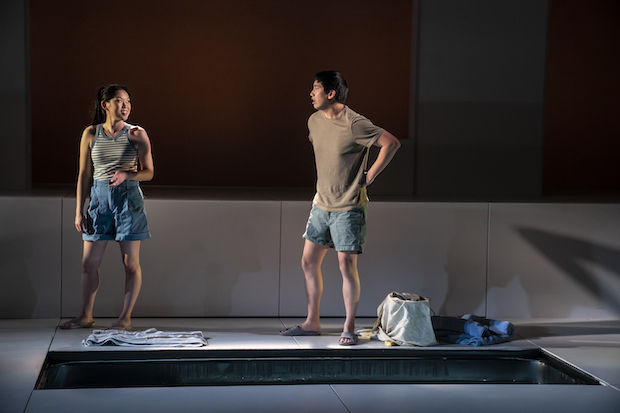Review: Good Enemy, Immigrant Parents, and the Luxury of Forgetting
Yilong Liu’s new play makes its world premiere with Audible Theater.

(© Joan Marcus)
In fashionable racial discourse, one of the many privileges attributed to whiteness is the ability to forget — to lose all connection to the old country from which one's ancestors fled and embrace "American" as a national identity. The jury is still out on whether this is something that can only ever be unique to white people (an elastic census category), but one Chinese American man is trying very hard in Yilong Liu's Good Enemy, now making its world premiere with Audible at the Minetta Lane Theatre.
It's the story of Howard (Francis Jue), a widowed Chinese immigrant who decides to drive from his home in the San Gabriel Valley to make a surprise visit to his daughter, Momo (Geena Quintos), who is attending college in New York. He enlists her weed-dealing ex-boyfriend Dave (Alec Silver marinating in SoCal shadiness) to play chauffeur.
None of this is likely to please Momo, who is living in Williamsburg with her white boyfriend (Ryan Spahn) and has limited her communication with Dad during the pandemic. He mostly keeps up by watching her TikTok videos, which he finds far too sexual. Even worse, she has posted video of herself at a protest, putting her skin and politics out there for all the world to see. (In truth, both should be wary of freely offering data to a firm whose Beijing-based parent company is almost certainly under the sway of the Chinese Communist Party.)

(© Joan Marcus)
Howard's fears are well-founded, as we see when the story flashes back to China in 1984 (that's pointed) and a young policeman named Hao (Tim Liu). His superior officer (Ron Domingo) has assigned him to monitor a group of young people indulging in Western music (Joy Division plays an important role). Hao ends up falling in love with one of them, Jiahua (Jeena Yi). The ensuing tale of flirtation, surveillance, betrayal, and bravery makes for edge-of-your-seat viewing. We also understand why Howard might want to keep this thriller to himself.
"I'm sick of feeling like a book whose first chapter is missing," Momo whines. Both of her parents have purposefully kept her in the dark about their lives in China. Only Dad is left now, and he's not talking, threatening to make Momo yet another American unmoored from history.

(© Joan Marcus)
Jue and Quintos have a genuine father-daughter vibe, with Jue serving a healthy dose of snark that is unexpected from a Chinese patriarch (at least, among those of us who don't speak Chinese). We feel his lonely agony as he mentally replays his memories, a ghostly visitor to his own past.
Liu and Yi turn these memories into flesh-and-blood reality, depicting a budding romance that is completely enchanting in its idiosyncrasy. It's enough to make us forget that we're witnessing an undercover operation. Maybe it's enough to make Officer Hao forget too.
Director Chay Yew expertly bleeds past into present with a staging that works best when he keeps things simple. Junghyun Georgia Lee's set —multiple blocks and frames in off-white — seems to promise a mise-en-scène that sacrifices nothing in terms of clarity while inviting the audience to fill in the blanks with our imaginations. However, in a testament to the resources Audible (a subsidiary of Amazon) can marshal: Yew and Lee have installed a small pool of water in the stage to depict the river in which Hao and Jiahua swam during their secret dates. The realistic splish-splash of the water makes for some arresting moments — the price being that a large portion of the audience seated in the orchestra can barely see the actors as they fall in love with their heads peeking up from the trap door.

(© Joan Marcus)
Far more effective are Reza Behjat's lighting and Mikhail Fiksel's sound: They conjure the river with just a couple of cues, returning it to the realm of suppressed memory just as quickly. Mel Ng's costumes are similarly thoughtful, with the '80s characters wearing generic versions of the clothes American kids might have worn a few years before (which, of course, would have been the best that Westward-facing kids who were not Communist princelings could have done in Deng's China).
Sightline quibbles aside, Good Enemy is a handsomely produced world premiere of a play that is gripping, heartbreaking, and undeniably important. History is an onerous burden, but its obliteration is a luxury that we may not be able to afford.











